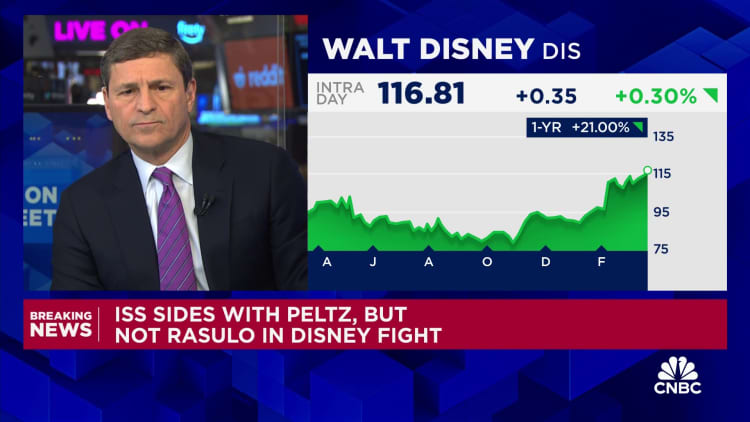Bob
Iger
and
Nelson
Peltz.
CNBC
In
2015,
Nelson
Peltz’s
Trian
Partners
was
defeated
in
an
activist
campaign
against
chemical
firm
DuPont,
largely
because
the
top
three
institutional
shareholders
voted
against
his
slate.
Nearly
a
decade
later,
those
same
institutional
investors
—
Vanguard,
State
Street
and
BlackRock
—
are
the
three
largest
shareholders
in
Disney.
And
they
could
make
or
break
Peltz’s
campaign
against
the
board
that’s
backing
Disney
CEO
Bob
Iger.
BlackRock,
a
4.2%
Disney
shareholder,
is
backing
management,
The
Wall
Street
Journal
reported
Monday.
T.
Rowe
Price
and
Norway’s
sovereign
wealth
fund,
both
smaller
shareholders
but
well-known
names,
have
confirmed
to
CNBC
they’re
also
backing
the
current
management.
Vanguard,
with
an
8.4%
stake,
has
also
chosen
to
back
management
over
Peltz,
Bloomberg
News
reported
Tuesday.
Of
the
three
top
shareholders,
only
State
Street’s
position
is
unclear.
All
institutional
shareholders
can
change
their
vote
through
Wednesday.
Trian
already
has
fighters
in
its
corner.
Former
Marvel
chairman
Ike
Perlmutter
has
entrusted
Peltz
with
his
33
million
Disney
shares,
the
bulk
of
the
activist’s
1.8%
stake.
New
York
City’s
retirement
fund,
Neuberger
Berman,
and
the
California
pension
plan
CalPERS,
said
they
support
the
activist.
Peltz
also
won
the
backing
of
proxy
advisory
firms
ISS
and
Egan-Jones.
The
showdown
between
Trian
Partners
and
Disney
touches
on
some
of
the
most
complex
issues
confronting
executives
today,
whether
it
is
CEO
succession
or
the
role
of
corporations
in
confronting
so-called
“woke”
social
issues.
Iger
left
the
CEO
post
in
2020.
His
successor,
Bob
Chapek,
was
ousted
in
2022,
with
Disney’s
board
inviting
Iger
to
take
the
top
post
once
again.
The
succession
failure
has
been
highlighted
by
proxy
advisory
firms
and
Trian
itself.
Disney
says
Peltz’s
efforts
distract
from
Iger’s
efforts
to
turn
the
company
around.
Trian
argues
that
Peltz’s
expertise
would
help
the
company
find
a
second
successor
to
Iger
and
fix
its
underperforming
stock.
Both
sides
have
made
their
case
to
investors
for
months
in
media
appearances,
conferences,
one-on-one
dinners,
and
meetings
with
top
investors.
But
the
institutional
vote
will
be
key
at
Disney.
Just
33%
of
shareholders
are
considered
retail,
a
significant
amount,
but
they’re
less
likely
to
vote
than
their
institutional
peers.
Vanguard
is
the
largest
holder
with
8%
of
outstanding
Disney
shares.
It
can
punch
above
its
weight
in
deciding
whether
to
elect
the
dissidents
to
Disney’s
board.
That’s
because,
like
in
a
political
election,
not
every
eligible
voter
will
vote
during
Disney’s
shareholder
meeting.
In
2021,
for
example,
63%
of
Disney
shareholders
voted
their
shares,
according
to
data
analyzed
by
13D
Monitor.
In
a
contested
election,
that
number
is
likely
to
go
much
higher
as
proxy
solicitors
on
both
sides
canvass
shareholders,
13D
Monitor’s
Ken
Squire
said.
“With
the
introduction
of
the
universal
proxy
card,
you
should
get
better
turnout
as
well,”
Squire
told
CNBC.
Disney
has
hired
Innisfree
M&A
for
their
solicitation.
Trian
is
splitting
the
load
between
Okapi
Partners
and
D.F.
King.
Courting
the
big-name
institutions
and
retail
investors
Visitors
in
front
of
the
Cinderella
Castle
at
Tokyo
Disneyland
in
Tokyo,
Japan
on
Jan.
17,
2023.
Bloomberg
|
Bloomberg
|
Getty
Images
Retail
investors
have
seen
advertisements
or
received
mailers
or
phone
calls
urging
them
to
vote
for
either
Disney,
the
white
proxy
card,
or
Trian,
the
blue
proxy
card.
More
than
half
of
the
vote
in
the
fight
has
already
been
counted
as
of
Monday,
according
to
The
Wall
Street
Journal.
“Shareholders
can
change
their
mind,
but
unlike
most
institutional
investors,
individual
shareholders
start
voting
as
soon
as
they
receive
the
proxy. As
such,
most
individual
votes
are
already
accounted
for,”
John
Ferguson,
senior
partner
at
proxy
solicitation
firm
Saratoga
Proxy
Consulting,
told
CNBC.
The
solicitors
are
tasked
with
pitching
retail
shareholders,
although
courting
and
winning
institutional
investors
is
a
bigger
priority.
Advisors
on
both
sides
have
tried
to
win
support
from
Vanguard,
Blackrock
and
State
Street.
Vanguard
and
Blackrock’s
reported
support
for
the
board
is
an
affirmation
of
Iger’s
stewardship
of
Disney.
If
Peltz
had
managed
to
secure
support
from
those
investors,
it
would
have
been
a
clear
sign
to
Wall
Street
that
the
activist’s
concerns
at
Disney
—
the
failed
succession
process,
an
apparent
distraction
from
storytelling
in
favor
of
“messaging,”
and
an
expensive
M&A
and
investment
strategy
—
held
some
merit.
The
chances
that
institutional
investors
would
be
swayed
by
Peltz’s
arguments
were
buoyed
when
proxy
advisor
ISS
came
out
in
partial
support
of
Peltz
in
March.
Proxy
advisors
help
shareholders
decide
how
to
vote
their
shares
on
a
particular
issue,
by
analyzing
a
company’s
financials
and
meeting
with
their
advisors.
As
with
the
institutional
investors,
their
support
is
heavily
courted
by
advisors
on
both
sides.
Glass
Lewis,
the
other
major
proxy
advisory
firm,
announced
it
would
support
Iger
and
the
existing
board.
ISS
said
shareholders
should
vote
for
Peltz
and
withhold
their
support
from
Maria
Elena
Lagomasino,
one
of
two
current
Disney
directors
whom
Trian
is
attempting
to
unseat.
ISS
did
not
support
the
other
Trian
nominee,
former
Disney
CFO
Jay
Rasulo.
WATCH:
ISS
says
Disney
shareholders
should
elect
Nelson
Peltz
to
board

watch
now
